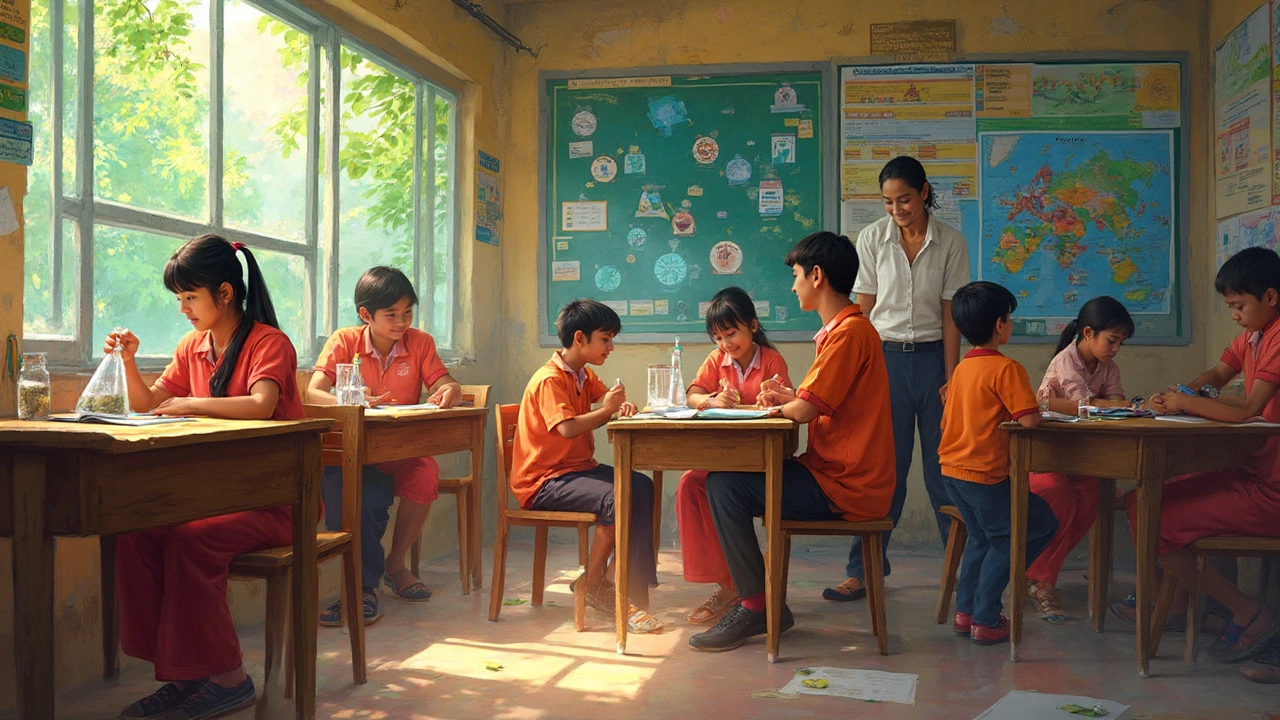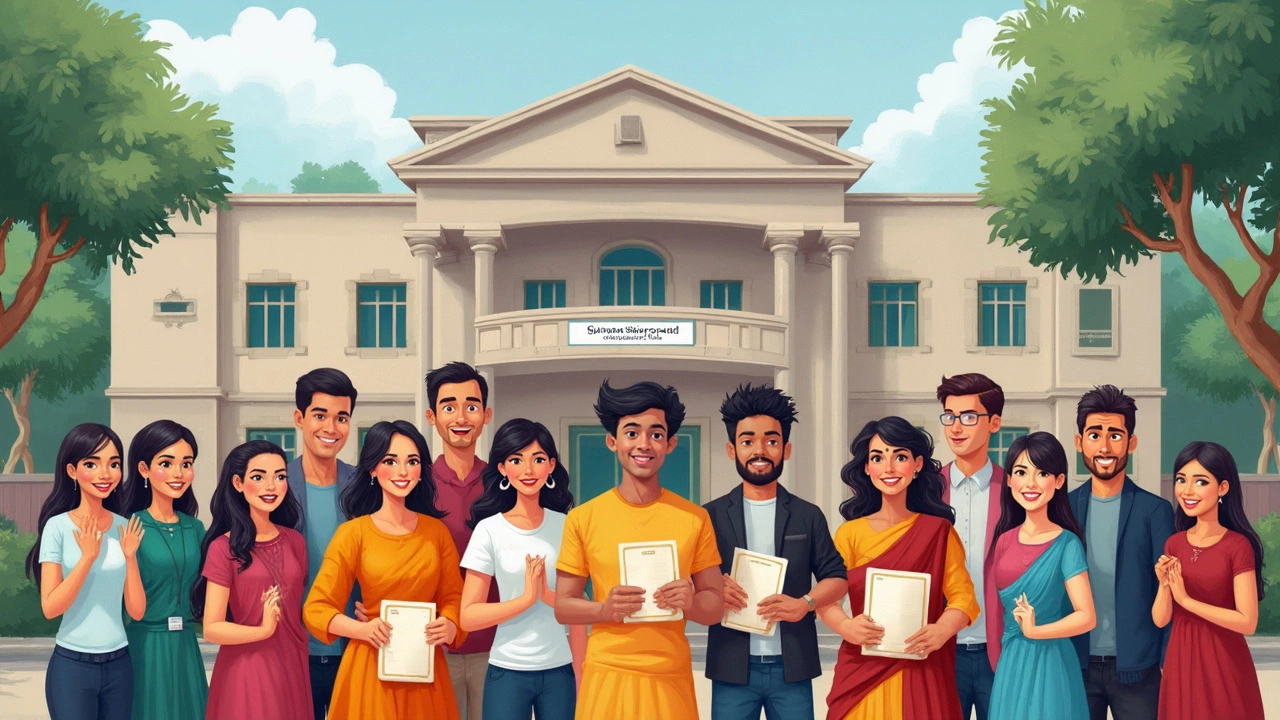
In India, the term '12th class degree' can leave many scratching their heads. What does it mean? Mainly, it's when students finish their Senior Secondary education. After the 10th grade, they step into this crucial phase, known as 'Senior Secondary School'. It's not just a milestone, but a gateway to colleges and future careers.
But wait, why is it called 'Senior Secondary'? Simply put, it's like saying you're in the final lap before hitting the big open road of college and professional studies. Most students are around 16 or 17 when they tackle this grade. Here, they pick a stream - Science, Commerce, or Arts - based on what interests them the most or what aligns with their career goals.
Now, speak of boards. Most have heard of CBSE and ICSE, right? These are just a couple of bodies governing the education curriculum. Each board has its own set of exams, each one crucial and widely recognized. A passing certificate from them? It's your key to stepping into universities across India and even abroad. Understanding how this works can save a lot of confusion and help in making informed decisions down the line.
- Understanding the 12th Grade in India
- Why It's Called Senior Secondary
- Different Boards and Their Certifications
- Streams and Specializations
- Preparation Tips for 12th Grade Students
Understanding the 12th Grade in India
The 12th class degree in India is much more than simply the end of school. It's a decisive year, paving the pathway to university life or the job market. Officially, it’s called the Senior Secondary School Certificate. This certification marks the completion of higher secondary education.
Why It Matters
Why is this stage so significant? In one word: opportunities. Universities and colleges, both in India and abroad, often view this as a benchmark of academic achievement. For those stepping directly into careers, it serves as a qualification for numerous entry-level positions.
Not to forget, the year signifies the end of structured schooling and the beginning of self-directed learning, which is a big deal for students transitioning to a different educational setup.
Known Facts and Figures
The 12th grade is governed by different educational boards. The most popular ones are the CBSE and ICSE. As of 2023, CBSE alone has over 20,000 schools under its umbrella across India.
Here's a quick look at some stats related to the number of students taking the 12th-grade exams:
| Year | Students Appeared (CBSE) |
|---|---|
| 2020 | 1.2 million |
| 2021 | 1.4 million |
| 2022 | 1.5 million |
Common Challenges
Students often face intense pressure during this grade. It’s not just the workload; the looming college entrance exams weigh heavily on their minds. Stress management, therefore, becomes crucial. Parents and teachers play a critical role in providing support.
So, whether it’s through the unmistakable hustle of preparing for competitive exams or seeking guidance for future steps, the 12th grade is a pivotal point in a student's life journey.
Why It's Called Senior Secondary
The term 'Senior Secondary' might sound a bit fancy, but it's pretty straightforward. It's all about marking a step up in the education ladder. In India, after the 10th grade, students move into this phase which spans 11th and 12th class grades. It’s like the bridge that connects school-level education with university studies.
Here's how it works. The education journey in India is structured into stages: lower primary, upper primary, secondary, and yes, senior secondary. By the time students reach senior secondary, they are prepared to dive deeper into specialized subjects. This stage is crucial as it gears them up for future academic and career opportunities.
Specialist Streams and Focus
Why the big deal about senior secondary? This stage allows students to specialize in a stream that aligns with their interests and their future ambitions. Choices usually boil down to Science, Commerce, or Arts. Each stream comes with its own set of subjects, preparing students for professional courses or undergraduate degrees that follow.
The emphasis is on deep learning and focused preparation, so students are equipped with the necessary skills and knowledge. It’s like tailoring your education to fit what you want to do next in life, whether that’s engineering, medicine, business, or creative arts.
Board Certification and Recognition
When talking about recognition, completing your senior secondary education is a big deal. You receive a certificate from your board, like the CBSE, which is respected both in India and worldwide. These certifications are not just papers. Think of them as hall passes allowing you to explore higher education or start vocational training.
This stage also plays a role in shaping your readiness for university. Many global universities understand and recognize the Indian senior secondary format, which is why so many students use it as a springboard for studying overseas.

Different Boards and Their Certifications
India's education system is a bit of a labyrinth, with a variety of boards offering slightly different flavors of the same content. It's like choosing between different brands of ice cream – the essence is the same, but each has its own twist!
Central Board of Secondary Education (CBSE)
The CBSE syllabus is often favored by those aiming for competitive exams like IIT-JEE and NEET. CBSE's Senior Secondary assessment, known as the All India Senior School Certificate Examination (AISSCE), is typically structured around applications and concepts. Its wide recognition makes it appealing for students planning to go abroad for college or seeking national colleges.
Indian Certificate of Secondary Education (ICSE)
The ICSE board is known for its detailed and extensive syllabus. The Indian School Certificate (ISC) examination similar to CBSE focuses on comprehensive education and practical knowledge. English is given heavy importance, which sharpens language skills, often benefiting students aiming for humanities or business streams.
State Boards
Almost every state in India has its own education board, crafting a curriculum that often includes a mix of regional and national topics. These boards usually conduct Senior Secondary exams, catering more specifically to local languages and knowledge in addition to general subjects.
International Boards
For those looking for an international flair, there's the International Baccalaureate (IB) and Cambridge's A-Levels. These are quite different, focusing on a holistic approach and critical thinking. While they aren't the go-to for everyone due to the cost and specific curriculum, they prepare students well for international education standards.
Here's a quick look at the numbers:
| Board | Recognition | Popular in |
|---|---|---|
| CBSE | National and International | Urban Areas |
| ICSE | National and Select International Colleges | Metro Cities |
| State Boards | State Level | Respective States |
| IB | International | Global Cities |
Whichever board you choose, each has its own perks. Understanding these can help make an informed decision, ensuring the choice aligns with your future plans and career aspirations.
Streams and Specializations
When students in India complete their 10th grade, they are faced with a big decision: which stream to choose for their 12th class degree. This decision plays a huge role in determining their future career paths. Let's break down the choices, making it easier to understand what's best for you.
Science Stream
First up is the Science stream, known for being a favorite among those aspiring to enter fields like engineering, medicine, or technology. It's packed with subjects like Physics, Chemistry, Biology, and Mathematics. Many students go this way because it opens doors to both Science and non-Science fields later. As one well-known educator, Dr. A.P.J Abdul Kalam, once said,
"Science is a beautiful gift to humanity; we should not distort it."
Commerce Stream
Next is the Commerce stream, which is the go-to for budding business minds. Want to dive into accountancy, finance, or business studies? This is your spot. Subjects like Economics, Business Studies, and Accountancy provide a solid foundation for careers in business management, finance, and even law if that's your interest.
Arts or Humanities Stream
Then there's the Arts or Humanities stream, fantastic for those with a creative or analytical mind, diving into subjects like History, Political Science, Psychology, and Sociology. It's a popular choice for those who want to pursue careers in areas like education, media, and public administration. Fun fact: Many of India's reputed civil service officers come from an Arts background!
Here's a quick table to compare subject offerings across the streams:
| Stream | Common Subjects |
|---|---|
| Science | Physics, Chemistry, Mathematics/Biology |
| Commerce | Accountancy, Business Studies, Economics |
| Arts | History, Geography, Political Science |
Choosing a stream is a major decision, but it's not one you're locked into forever. Consider what subjects excite you the most and where you see yourself in the future. It's a decision that affects how you experience the CBSE syllabus and prepares you for college and beyond. Keep exploring; keep learning!

Preparation Tips for 12th Grade Students
Ah, 12th grade. It's a rollercoaster, don’t you think? On one hand, you're excited about finishing school, and on the other, you're a bit daunted by the pressure of board exams and future plans. But don’t worry; we've got some pointers to help you sail through this year smoothly.
Get Organized Early
Start by organizing your study materials. Create a tidy study space. This might sound basic, but clutter can seriously affect focus. Make a study schedule, giving extra time to subjects that you find tough. Trust me, a plan is your best friend here.
"Plan your work and work your plan." - Napoleon Hill
Understand the CBSE Syllabus
Make sure you get the hang of the CBSE syllabus. It's not just about memorizing but understanding concepts, especially if you're aiming at streams like Science or Commerce. The textbooks are your core guides. Go through the syllabus for each subject to know the topics and marks distribution.
Practice Mock Papers
You can’t skip this step. Practice with previous years' papers and CBSE sample papers. It’s the best way to know the exam pattern and manage your time during the actual exams. You'll also get familiar with commonly asked questions.
Take Care of Yourself
Remember, your health is as important as your studies. Don't skip meals and try to get at least 7-8 hours of sleep. Regular breaks are crucial too. A tired brain doesn't perform well!
Tools and Resources
Here’s a quick look at some useful tools:
- NCERT Books: Your trusted companions.
- Online Tutorials: Platforms like Khan Academy and Byju’s can make learning fun.
- Time-Management Apps: Apps like Trello or To-Doist keep you on track.
If you keep these simple tips in mind, you'll be well on your way to acing your 12th grade. And remember, it's all about balancing hard work with smart strategies!
